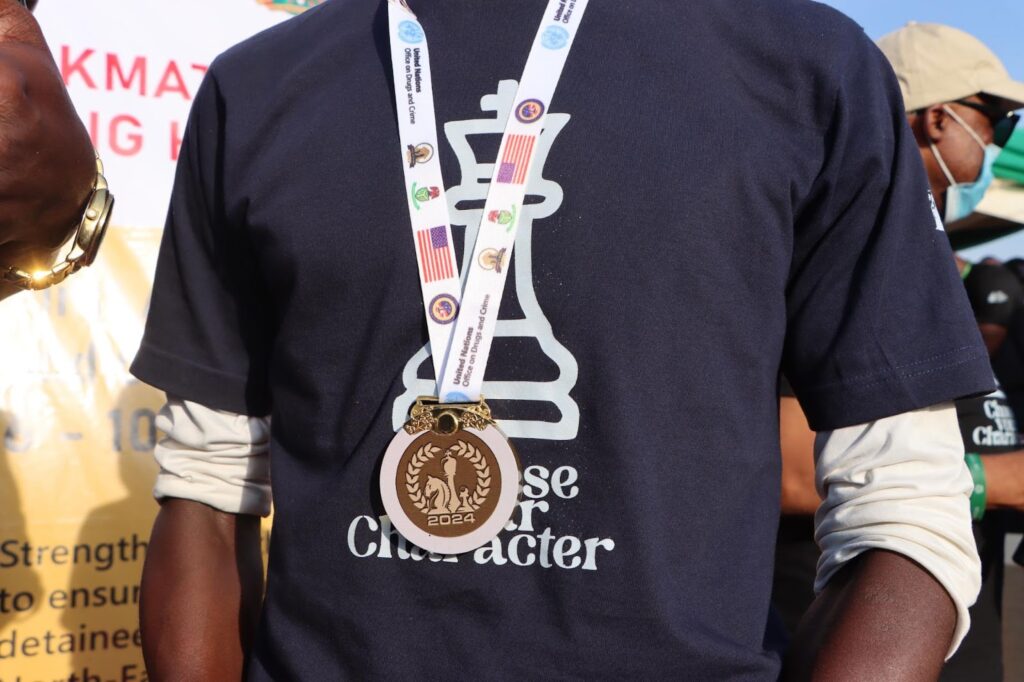In a rare sense of camaraderie, inmates and officers at the Maiduguri Medium Custodial Facility in Borno state, northeastern Nigeria, are discovering common ground through the ancient game of chess. This initiative, designed to foster mutual respect and encourage behavioural transformation, is reshaping lives within the prison walls.
When HumAngle visited the facility—home to both high-profile and lesser-known inmates either serving sentences or awaiting trial–the atmosphere defied expectations. The usually sombre prison yard was filled with laughter and cheers as prisoners and officers squared across chessboards. The lines separating roles blurred, leaving behind an air of hope and possibility.
This shift is the outcome of a groundbreaking initiative, ‘Chess in Prison’, launched by the United Nations Office on Drugs and Crime (UNODC) in partnership with Chess in Slums Africa, the United States Bureau of International Narcotics and Law Enforcement Affairs (INL), and the Nigerian Correctional Service (NCoS).
The project aims to enhance rehabilitation and foster better relationships between correctional officers and inmates across Nigerian prisons through chess.
Chess as a tool of change
“Before I came here, I always wanted to learn how to play chess. While freedom is priceless, I thank UNODC for thinking about people like us who are easily forgotten and giving us a second chance,” an inmate at the Maiduguri Medium Custodial Facility said. “Here in the prison yard, we are always excited to see the Nelson Mandela logo and UNODC’s presence because they put a smile on our faces.”
Since the programme’s inception in July 2024, over 300 inmates across Maiduguri’s custodial centres have shown interest in learning chess, with 80 inmates qualifying for the inaugural competition. This initiative has also brought together 25 correctional officers, bridging the gap between inmates and their custodians.
Competitions were held within and between Maiduguri’s medium and maximum correctional facilities in the lead-up to the final event. The grand championship, held on 10 December to mark International Human Rights Day, brought together inmates and officers from both facilities. The finale highlighted the transformative power of chess in fostering critical thinking, mutual respect, and personal development within custodial settings.
Building bridges
“This initiative facilitates inmates’ reformation, robust thinking, and positive focus during their jail term,” Adamu Bala Thliza, the Maiduguri NCoS Command’s Public Relations Officer, told HumAngle. “The game of chess encourages critical thinking and sharpens the minds of inmates for positive change in their lives. This competition has also strengthened the relationship between inmates and the officers protecting them.”
Several dignitaries, including Borno State Attorney General Hauwa Abubakar and Chinedu Ogah, Chair of the House of Representatives Committee on Reformatory Institutions, attended the event. Mr Ogah announced plans to address the facility’s water supply issues and establish an educational programme for inmates.
“We will provide educational services ranging from primary to undergraduate levels, depending on the educational needs of inmates,” he said, revealing partnerships with the University of Maiduguri and the National Open University to set up learning centres within the facility.
According to Ogah, education within prisons is a vital step toward rehabilitation, offering inmates the opportunity to transform their lives while serving their sentences.
A sense of purpose
Tunde Onakoya, Founder of Chess in Slums Africa, expressed his belief in the transformative power of the game. “Freedom is beyond living outside prison; freedom is the liberation of the mind. It is a hope for change,” he told the inmates. “Beyond the chess board, chess instilled a newfound sense of responsibility in these inmates. Their character, thoughts, and interactions began to reflect the discipline and patience the game demands.”
Onakoya noted how inmates embraced their new skills enthusiastically, often passing on their knowledge to others. Trainers at the event praised the participants for their rapid progress, emphasising the programme’s success in instilling valuable life skills.

Cheikh Toure, the representative of the UNODC’s Country Office in Nigeria, reiterated the impact of the Chess in Prisons programme. “Chess is more than just a game; it’s a platform for learning strategy, patience, and decision-making—skills that are crucial for successful reintegration into society,” Toure said.
She added, “The Nelson Mandela Rules remind us that the reformation and social reintegration of prisoners should be the essential aims of the prison system. Through initiatives like Chess in Prisons, we’re not just teaching a game but nurturing human potential, restoring dignity, and aligning correctional practices with fundamental human rights principles.”
Toure further noted that hosting the International Human Rights Day championship underscores UNODC’s commitment to fostering growth and dignity in custodial settings. “This championship serves as a powerful testament to our commitment to these ideals, proving that even behind bars, every individual has the right to grow, learn, and prepare for a better future,” she said.
The UNODC’s representative also pointed to the broader implications of the initiative, stating that ensuring humane treatment and fair opportunities for inmates is a cornerstone of effective rehabilitation and reintegration. “As society reflects on human rights, this event provides a unique opportunity to draw attention to the transformative potential of inclusive rehabilitation initiatives. What happens at custodial centres impacts society at large.”
The UNODC’s “Chess in Prison” initiative in Nigeria, launched in partnership with Chess in Slums Africa and other organizations, aims to improve rehabilitation and foster relationships between inmates and officers through chess.
The program, initiated in July 2024, has seen over 300 inmates and 25 correctional officers participating, with competitions culminating on International Human Rights Day.
This initiative not only enhances critical thinking and mutual respect but also bridges the gap between custodial officers and inmates.
Key figures such as Borno State’s Attorney General pledged support for educational services within the facilities, emphasizing that prison education is crucial for rehabilitation. Tunde Onakoya of Chess in Slums Africa highlighted chess’s transformative effect beyond prison, instilling responsibility and discipline in inmates. UNODC’s Cheikh Toure underscored the program’s alignment with the Nelson Mandela Rules, advocating for prisoners’ reformation and reintegration, with the championship event exemplifying UNODC’s commitment to human rights and dignified treatment in custodial settings.
